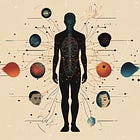Six More Heretical Truths
To Break the Spell of Default Conventional Wisdom
The first time I wrote about “heretical truths,” I thought it might ruffle a few feathers. Instead, it struck a chord. Maybe because most of us are drowning in conventional wisdom—bumper-sticker slogans about vision, resilience, productivity, healing—that sound noble but collapse on contact with real life.
Heresies wake us up. They knock the dust off. Here’s the original post:
And here are six more.
Heretical Truth #7: You don’t need a vision.
Steve Albini lived without goals. No five-year plan. No grand vision. And he saw that as freedom: “I never feel I haven’t achieved something. I never feel there is something yet to be accomplished.”
His measure of success was simple: do good work today in a way that’s fair and sustainable, so you can do it again tomorrow.
We’ve been trained to believe goals are oxygen. Sometimes goals are propulsive. But maybe they’re just anxiety machines. Maybe process is enough.
Heretical Truth #8: Impostor syndrome isn’t a syndrome.
Supposedly everyone has it—even Maya Angelou, even Tom Hanks. Which begs the question: if we all feel like frauds, is it still a syndrome?
The term was coined in the 1970s in a study of high-achieving women. Since then, it’s been watered down into a catch-all diagnosis that shifts the blame inward: fix your confidence, instead of fix the system.
The sharper move is to drop the “syndrome” label entirely. What we call impostor syndrome is really the crack between how we see ourselves, how we present ourselves, and how the world mirrors us back. Not a pathology. Just a human texture.
Heretical Truth #9: Trauma isn’t destiny.
Our culture has turned trauma into the master key for every locked door. Struggling? Must be trauma. But George Bonanno’s research suggests otherwise: most people recover. Flexibility, not fragility, is the norm.
This doesn’t mean trauma isn’t real, or that scars don’t matter. But the heresy here is saying trauma isn’t the whole story. We are not merely collections of damage. More often, we’re organisms of resilience.
Heretical Truth #10: The law deserves less respect than kindness.
Brendan Behan once said:
“I respect kindness in human beings first of all, and kindness to animals. I don’t respect the law… except that which makes the roads safer, the beer stronger, the food cheaper and the old men and old women warmer in the winter and happier in the summer.”
We’re told civilization rests on respect for the law. But Behan’s point is sharper: laws are abstractions. Kindness is lived. Rules may keep order, but mercy keeps us human.
Heretical Truth #11: The end of the world is a guilty pleasure.
Our appetite for apocalypse has never been bigger. And yes, the data is bleak. But apocalypse also gives us an emotional payoff. Psychologists call it “malefic ecstasy”: the strange thrill of imagining collapse.
If everything is ending, nothing is required of us.
The heresy here is to admit we’re not just afraid of the end. We’re seduced by it. Which means resisting despair isn’t only about facing facts. It’s about refusing the dark pleasure of doom.
Heretical Truth #12: Mediocre success is worse than failure.
We’re told to celebrate small wins. But mediocre success is the worst outcome of all. A failure teaches you something. A success does too. But a muddy middle? No clarity, no signal, no next step.
Better a clean no than a fuzzy maybe. Because life isn’t really about winning—it’s about learning. And only clarity teaches.
Taken together, these heresies sketch a different worldview: one less obsessed with goals, diagnoses, and guarantees, and more attuned to process, resilience, mercy, and clarity. Less about chasing some shining future, more about learning how to live with each other, here and now.
Maybe that’s the ultimate heresy: to trust that what sustains us isn’t vision, or law, or the perfect cure, but something humbler, stranger, sturdier.

